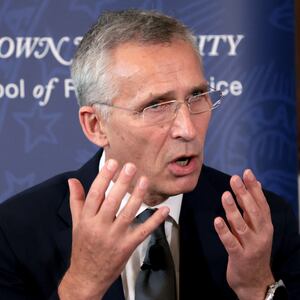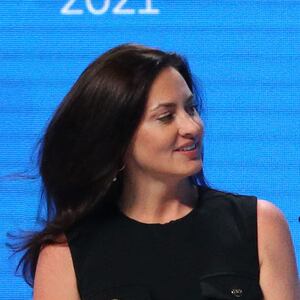MOSCOW—The Kremlin kicked off the week with a historic decision to end Russia’s cooperation with NATO, strip all NATO staffers of their accreditation in Moscow, and suspend its own mission in Brussels after the expulsion of eight Russian members who were accused of espionage earlier this month. NATO’s military and information offices will close down in the Russian capital on Nov. 1.
The move marks the bitter end of a long, fraught relationship. Russia and NATO had been working to reach an understanding for more than two decades, since 1994, when Moscow joined NATO’s Partnership for Peace program after nearly five decades of the Cold War.
“This is the final and formal divorce between Russia and NATO,” Moscow-based political analyst Yuriy Krupnov told The Daily Beast on Monday. “But Vladimir Putin started the process 14 years ago with his speech in Munich.”
The Kremlin has long been frustrated about NATO’s expansion toward Russian borders. Even before the war in Georgia in 2008, state media would often launch into fearmongering tirades about NATO missiles in Europe, painting them as invisible monsters that should terrify the Russian public. “It turns out that NATO has put its frontline forces on our borders, and we continue to strictly fulfil the treaty obligations and do not react to these actions at all,” Putin said in his infamous speech at the 2007 Munich Security Conference, a year before Russian tanks, artillery and aviation attacked NATO-friendly Georgia.
During Putin’s first presidential term, Kremlin officials debated joining the alliance. Ex-Duma deputy Sergei Markov recalled his visits to Brussels with a Russian delegation. “I asked NATO officials for some guarantees that there would be no NATO nuclear weapons in Eastern Europe, but NATO did not want to sign any firm agreements with us back when we had good relations,” Markov, a pro-Kremlin analyst, told The Daily Beast. “Many NATO generals know that Russia was right to be upset about the expansion… [now] Russia is going to boost its alliances with Turkey, China, and Iran, but we still need to cooperate with NATO during military exercises and in combat zones, where both Russian and NATO soldiers are on the same ground, like in Syria.”
Many thought that Moscow’s divorce with NATO would be finalized at the end of the week-long destructive war in Georgia over a decade ago, after Russian Federal Security Services stretched their barbed wires across Georgia’s territory, dividing Georgian families and neighbors with a new border. But just three years later, Russia offered NATO forces logistical and strategic support in Afghanistan.
The swings in Brussels-Moscow relations continued. NATO welcomed Moscow’s supply of helicopters and trained pilots in Afghanistan in 2010. Two years later, the two powers even discussed a joint transit base to Afghanistan, with the Kremlin offering up Ulyanovsk, Vladimir Lenin’s birthplace, of all places. “To my knowledge NATO has been using that transit base up until recently,” Markov said about one of the highlights of the Russia-NATO relationship.
But those high points were often interrupted by thorny points of contention, including Russia’s annexation of Crimea, which prompted NATO to suspend its cooperation with the country in 2014.
Now, the build-up of disagreements seems to have reached a point of no return.
In June, NATO Secretary General Jens Stoltenberg called for a Moscow-NATO meeting, in which he described relations as being at their “lowest point” since the end of the Cold War. The latest squabbles escalated earlier this month, when NATO expelled eight out of 20 Russian members of a NATO mission for espionage.
On the day Russia made the decision to break up with NATO, U.S. Secretary of Defense Lloyd Austin arrived in the Georgian capital of Tbilisi. His next stop is Ukraine, where he’s expected to continue to offer reassurances about America’s support for its allies in their struggle for independence.
“Russia’s total divorce with NATO is happening at a time when Putin has emerged from his global isolation, thanks to President Biden,” Konstantin Eggert, an independent political analyst, told The Daily Beast.
“It seems well-staged,” he added. “The energy crisis in Europe, the victory of the Social Democrats in the election in Germany… As Victoria Nuland’s visit demonstrated last week, Putin once again demonstrates to the West that they cannot do without Russia, neither in Afghanistan nor with the energy crises. And unfortunately, at this weak stage in Europe, Ukraine or Baltic countries will be paying the price.”
Few in Moscow express regret about Russia’s own mistakes in the ruined diplomatic relations with NATO. “We have traveled a long way from thinking of joining NATO to helping NATO with tons of logistics in Afghanistan to the day of divorce,” Krupnov said. “NATO has grown into a global military organization, so there is a new situation: Russia is once again left to stand alone.”








